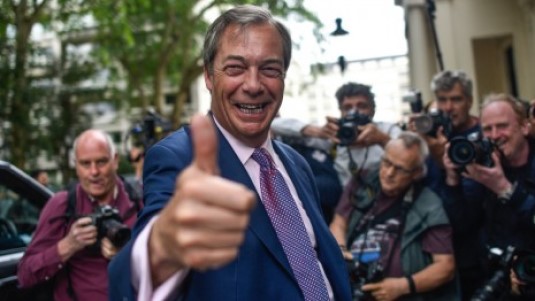
The Brexit Party was a curious beast as far as British politics was concerned. Birthed more or less simultaneously with the much-missed Independent Group/Change UK, neither formations were proper political parties. Membership was so 20th century, there was no democracy, and they were wholly owned corporate entities under the direction of their respective proprietors. Our erstwhile Labour comrades crashed and burned, while Farage cleaned up at the EU elections. Then at the general election his decision to stand in Labour-held seats had the desired consequence of bleeding protest-voting leave supporters from Labour and helping the Tories to victory on dozens of occasions. But when one is in possession of a successful enterprise, what to do when its raison d'etre nears expiration? How do you keep the money from the gullibles flowing in and the grift on the road? With plenty of fools making a song and dance about Coronavirus restrictions, and seeing they articulate their positions in the victim mentality terms of the populist right, it's a seam worth tapping. And without any democratic accountability weighing Farage down, why not?
There are difficulties with a move in this direction. According to YouGov, a big majority support the idea of a new lockdown (despite being half-arsed). Examining the age splits, the over 65s - long the bedrock of UKIP/BXP support - are most likely to support the measures while the young, hardly Farage country, are the most sceptical. Still, Reform UK's predecessors never commanded the allegiance of too many people, and if up to a fifth of old voters are game for an anti-lockdown politics they could scoop up some seats in May, especially when you consider older people disproportionately turn out for these elections.
As Stephen Bush has variously noted, other problems facing Farage is the lack of periodic PR elections by which he can pressure the Tories from the right. As he'll soon find out, winning a handful of council seats doesn't have quite the same impact of sending a posse of misfits to Brussels. Then again, all he has to do is spook some flighty Tory MPs. As the Tories continue to neglect the north, some are feeling the heat. A few council seats won by Farage in Tory seats where UKIP previously did well and it's squeeky bum time. Which, of course, is exactly where he wants to be. Exerting a pull on the Tories, getting plastered all over their press, feted like a senior statesman and a notable, this will do nicely for Farage. There's no need for ambition beyond that.
Another grift for Farage, but it doesn't end there. He's intentionally and happily emitting political toxins with potentially deadly consequences, polluting politics and poisoning the atmosphere as he's done for the last 20 years. Farage doesn't genuinely believe the anti-lockdown pitch, it's a bandwagon for continued relevance. Unfortunately, he's about to legitimate a load of cobblers for his fan club, people who'll ignore the restrictions, perhaps protest them, and in the process expose themselves and their families to the virus with everything this entails. We've seen the Tories get away with (social) murder, so what's the likelihood Farage is going to be held to account for the demise of a few hundred gormless followers?
Image Credit
The connection between all this, and Farage's new "Investment Advice" company (whose ads are bombarding Facebook and constantly segwaying into YouTube films) is, I feel, pretty blatant. And on this 'City Tips' firm, the FT's own Money Advice specialists are today scathing, advising readers to purchase a very long barge pole; https://www.ftadviser.com/opinion/2020/10/21/beware-farage-s-advice/
ReplyDeleteAnyone every thought how having a proportional voting system would help pressure Labour from the left?
ReplyDeleteTime to GET PR DONE! https://www.facebook.com/groups/625143391578665/
«having a proportional voting system would help pressure Labour from the left?»
ReplyDeleteThat seems to me wishful thinking, while the dream of the "whig" right-wingers is PR, based on the idea that other things being equal, it would mean that both Labour and Conservatives would always need the LibDems for Coalition governments; so in Coalition with the Conservative they would agree to thatcherite policies and demand identity politics legislation, and in Coalition with Labour they would agree to identity politics legislation and demand thatcherite policies. That's why Tony Blair had PR in the 1997 election manifesto.
But it may not work out like that: other things would not be equal, with PR both the Conservative and Labour parties would split, and not all possible combinations would require the LibDems. Indeed the LibDems may disappear as their voters might migrate to the parties receiving the "moderate" (whiggish) wings of the Conservative and Labour parties, and those parties might not have a determinant role in a Coalition.